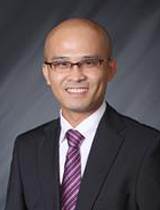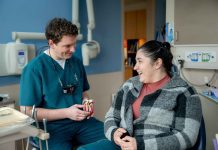March is National Colorectal Cancer Awareness month. In 2000, then President Bill Clinton declared the first month of spring to be remembered for more than just the end of winter; moving forward, this month would promote colon cancer awareness and honor those who battle it.

Colon cancer can be a touchy subject. A lot of people have misconceptions and are put off by what doctors must do to pinpoint and treat those suffering from the disease. Dr. Steve Ho sat down with us to discuss the importance of maintaining a healthy GI tract, colonoscopies and the greater world of gastroenterology and endoscopy.
Dr. Ho joined the PeaceHealth team five years ago, following extensive training in the fields of gastroenterology and endoscopy. He obtained his medical degree from University College Dublin in Dublin, Ireland, and went on complete a medicinal internship at the University of New Mexico. He did a fellowship at the University of Ottawa, followed by additional training at Virginia Commonwealth University.
This extensive education is important. According to Dr. Ho, the fields of gastroenterology and endoscopy are some of the most versatile in medicine, because both procedural and cognitive elements are involved. For example, Dr. Ho can work with a patient from the very beginning, diagnose their problem and then treat the issue with a surgical procedure, if need be. He enjoys his job because he’s involved in every step of the medical process.
“Since I was young, I’d always wanted to be a physician, but wasn’t sure exactly which field until I was in medical school,” Dr. Ho says. “It was in medical school that I realized how interesting, exciting and unique gastroenterology and endoscopy were.”

Gastroenterology involves the study of multiple organs and, contrary to popular belief, not just the intestines. Gastroenterologists study the esophagus, stomach, rectum, pancreas, gallbladder, bile ducts and liver, in addition to the colon and small intestine. The main job of a gastroenterologist is to help patients manage, combat and cure diseases of the gastrointestinal tract and liver. Gastroenterologists use an endoscope to look inside the body, most commonly during a colonoscopy.
According to Dr. Ho, many people have misconceptions about colonoscopies and what exactly gastroenterologists do. As he ponders these misconceptions, he can’t help but laugh. “The average person thinks all we do in our field is deal with poo – but that couldn’t be further from the truth.”
In reality, before Dr. Ho and his colleagues perform endoscopies, the colon must be clean. Dr. Ho’s patients are put on a regimen to encourage good bowel movements and clean out the area. This way the medical team can effectively search for polyps and detect signs of colon cancer.
The presence of polyps can indicate a higher risk for colon cancer. It’s recommended that average risk patients (anyone without a history of colon cancer in their family) get their colon checked when they turn 50. But, if you happen to be an at-risk patient with a family history of colon cancer, you should get screened earlier.
“It’s always important that people get their recommended screenings,” says Dr. Ho. “I think now is an especially good time since March is Colon Cancer Awareness Month. Maybe we can get more people to come in for screenings and set an example for others.”

It’s natural to be uncomfortable with the idea of a colonoscopy, but don’t let this deter you from getting checked for colon cancer. Dr. Ho wants it known that there are other ways for gastroenterologists to screen for colorectal cancer. Although colonoscopies are the most common – and may be the most effective – way to check, he says they will find alternative methods if you aren’t okay with receiving one.
“Colon cancer is the most preventable form of cancer,” Dr. Ho says. “I strongly encourage people to get checked. If you get checked and we find polyps, we can remove them from your body before they become cancerous.”
The field of gastroenterology isn’t always so certain though. Many diseases of the GI tract have similar symptoms. It takes thorough and careful examination to determine what exactly each individual patient is experiencing. This is why seeing a trained professional like Dr. Ho is so important.
Fortunately, there are many things people can do at home to keep their GI tract healthy and avoid GI tract disease. Dr. Ho recommends maintaining a healthy diet full of fiber, fruits and vegetables. Cut processed foods from your diet and get plenty of exercise. A healthy diet and physical activity go hand in hand in maintaining optimal GI tract health.
“I like to tell my patients to think of their body as a house and to think of their GI tract as the plumbing,” Dr. Ho says. “In your house you want to make sure everything is fixed, that everything is working – especially something as integral as the plumbing.”
Sponsored








































